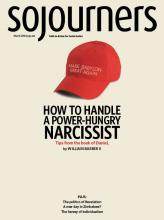I FEEL POLITICALLY homeless as we enter 2018, and I know I am not alone. Many are feeling the same, as other Christians, especially white evangelicals, have offered uncritical support for a president who is the antithesis of the gospel of Jesus Christ, endangering the witness and reputation of Christianity, especially among the younger generation.
Of course, the two political parties are not morally equivalent. But the Republican Party’s political sellout to Donald Trump and the Democrats’ lack of a clear moral alternative that many people of faith are excited to support leave many of us feeling politically homeless.
Republican leadership has sold its party’s soul to an amoral, childish, and dangerous man. He has been revealed as intellectually shallow, a person who lacks a moral conscience, and an unapologetic promoter of racial bigotry and misogyny. His disrespect for the rule of law and our political system of checks and balances can best be described as narcissistic and authoritarian paranoia, which creates a dangerous threat to American democracy and national security.
While some Republican commentators and elected officials have voiced opposition to the president’s behavior, the Republican Party has substituted a moral relationship to the presidency for a transactional one, in which they ignore Trump’s manifest unfitness for the office in exchange for enacting policies that support the greedy demands of their wealthiest donors. In doing so, the GOP has disregarded the espoused values of principled conservatism: fiscal integrity and responsibility, an allegiance to truth and honesty, genuine pro-family values, national security through global engagement, a commitment to opportunity for all and empathy for those in need, and the worth and equality of every person under the law.
Read the Full Article

